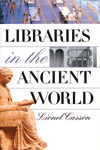
Language is the loveliest of human gifts, the most nearly divine. Inevitably language leads to literature, literature to books, and books to libraries—whose noble ancient history is smartly and lovingly traced by Lional Casson, a Professor Emeritus of Classics at New York University. This is a book many of us have been hoping, even longing, to read for a long while.
For thousands of years libraries have held the store of human wisdom, knowledge and creativity. Ancient libraries flourished at such unfamiliar places as Ebla in Syria (late third millennium B.C.E.), Hattusa in Anatolia (late second millennium B.C.E.) and Nineveh in Mesopotamia (mid-first millennium B.C.E.). The first-century B.C.E. Greek historian Diodorus informs us that the Egyptian pharaoh Ramesses II (1279–1213 B.C.E.) had a library that he named “Clinic for the Soul.”
These earliest libraries consisted mostly of royal archives—commemorating a king’s victory in battle, recording tribute or listing the cities of the realm. With the arrival of Greco-Roman civilization, however, came both private book collections and large research libraries—in Seleucid Antioch, Attalid Pergamum, Athens, and Rhodes. The greatest of these research institutions was undoubtedly the Alexandria Library, which lasted from 300 B.C.E. to 642 C.E., when it was destroyed during the Arab conquest. During its thousand-year existence, scholars at this university-like institution prodigiously served the quest for knowledge; not only did they compile works of religion, history and literature, but they formulated the principles of geometry (Euclid), measured the circumference of the earth (Eratosthenes) and mapped the known world (Ptolemy).
The Romans followed the Greek model in many ways, with wealthy aristocrats amassing notable personal libraries, as had Plato and Aristotle. In the third century B.C.E., Aemilius Paullus—whose father conquered Macedonia and whose sister married Scipio Africanus, conqueror of Carthage—created the first significant library in Rome by carrying off the royal Macedonian library. The Roman general and dictator Sulla (138–78 B.C.E.) soon followed Aemilius Paullus’s example, enhancing his collection with the then-ancient library of Aristotle, which had been kept by an Athenian bibliophile named Apellicon. By the first century B.C.E., any number of prominent Roman citizens owned large collections of books—including the orator Cicero, Cicero’s wealthy boyhood friend Atticus, and the general Lucullus, who was Sulla’s first officer and the conqueror of Persia.
Roman emperors honored their capital by building libraries, thus emphasizing the importance of learning and universal education. Julius Caesar planned a great library for Rome, which was indeed built after his assassination in 44 B.C.E. Augustus (27 B.C.E.–14 C.E.) built a second library for the capital city, the Library of the Temple of Apollo, and he later added a third, which he named after his sister Octavia. Trajan (98–117 C.E.) started a new trend of locating libraries in elaborate baths the emperors dedicated to themselves. Enormous baths outfitted with libraries were erected by Caracalla (211–217 C.E.) and Diocletian (284–305 C.E.).
As they conquered the world, Roman emperors brought libraries with them. Hadrian (117–138 C.E.) built libraries in Athens and Pergamum. Libraries were built in Ephesus and Halicarnassus in Anatolia, Timgad in North Africa and Bilbilis in Spain, and in numerous other towns throughout the empire. Even in Carthage, after virtually erasing the city from the face of the earth, the Romans built a fine library.
The Greeks, who wrote their books on scrolls made from either papyrus or animal skin, began quite early to follow a method used by the ancient Mesopotamians to keep track of collections of inscribed clay tablets. On one end of the scroll they pasted a tag that gave basic information on authorship, dating and content. An early director of the Alexandria Library, Callimachus (299–210 B.C.E.), developed an indexing system, called the Pinakes, similar to card catalogues in modern (or not-so-modern) libraries.a The Pinakes consisted of 120 scrolls containing basic information on the hundreds of thousands of roll-books in the library’s collection.
One delightful aspect of Casson’s volume is its citations of interesting, frequently humorous and often informative inscriptions, quotations and aphorisms from ancient literature or library buildings. An ancient identification tag on a clay tablet from the Hittite capital of Hattusa reads: “Second tablet of Tudhaliyas, the great king, on the oath. End. This tablet was damaged; in the presence of Mahhuzi and Halwalu, I Duda, restored it.”
Apparently actors performing the plays of Aeschylus, Sophocles, and Euripides tended to be lazy in memorizing their lines, so the Athenian statesman Lycurgus (390–325 B.C.E.) ordered that written versions of the scripts be preserved in the city records office and that the clerk read them to the actors—who were “not to depart from them.”
The scholars at the great Alexandria Library were on a generous royal stipend, prompting an ancient wit to identify them as “The scribbling bookworms who are found / In Egypt’s populous nation, / In endless debate as they flock / Round the muses’ feeding station.”
Humor and irony reigned even in monasteries. An early seventh-century C.E. bishop of Seville, Isidore, prepared an inscription for a library doorway that might be useful in the age of cell phones: “When a writer’s at work, / Someone talking aloud he cannot abide. / So, Chatterbox, there’s not place for you here. / Go on outside!”
Libraries in the Ancient World is a labor of love. Lionel Casson offers a delightful pilgrimage back to the earliest libraries, to the bright beginnings of recorded human intellect. “Study as the seasons go by,” advised Confucius. “Isn’t it a pleasure?”
MLA Citation
Footnotes
See Dan Bahat, “Does the Holy Sepulchre Church Mark the Burial of Jesus?” BAR 12:03.

